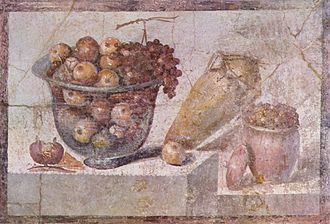Cena




Cena is a term that originates from Latin and is commonly used in various languages to denote the main meal of the day. The interpretation of cena can vary significantly across different cultures, regions, and historical periods. In contemporary usage, especially in the English language, it is often synonymous with "dinner" or "supper." The concept of cena holds not only culinary but also social and historical significance, reflecting the dietary habits, social structures, and traditions of different societies.
Etymology and Historical Context[edit]
The word "cena" directly comes from Latin, where it traditionally referred to the main meal eaten in the late afternoon or evening. In ancient Rome, cena was the most significant meal of the day and was an elaborate affair for the wealthy, often consisting of multiple courses and lasting several hours. It was a time for social interaction, including discussions on politics, philosophy, and daily events. The structure and timing of cena have evolved over centuries, influenced by changes in work patterns, cultural exchanges, and technological advancements in food preparation and preservation.
Cultural Variations[edit]
The interpretation and timing of cena vary widely across different cultures:
- In many Southern European countries, cena is eaten later in the evening, often after 8 p.m., reflecting a cultural norm of late-night socializing and dining.
- In contrast, in some Northern European and North American contexts, the main meal of the day, referred to as dinner or supper, is typically consumed earlier, usually between 5 p.m. and 7 p.m.
- The composition of cena also varies, with dietary staples and local ingredients playing a significant role. In Mediterranean cuisine, for example, cena may feature dishes rich in olive oil, vegetables, and fish, while in other regions, meat, potatoes, and bread might predominate.
Social and Family Dynamics[edit]
Cena is often more than just a meal; it is an opportunity for family and friends to come together, share their experiences of the day, and strengthen their bonds. The tradition of gathering for cena can have significant social and psychological benefits, fostering a sense of community and belonging. In many cultures, preparing and sharing a meal is an expression of love and care, with recipes and traditions passed down through generations.
Modern Trends[edit]
In recent years, changes in lifestyle and work patterns have influenced how and when cena is consumed. The rise of fast food, meal delivery services, and ready-to-eat meals has transformed dining habits, with a noticeable shift towards convenience and speed. However, there is also a growing movement towards slow food and sustainable eating practices, emphasizing the importance of taking time to prepare and enjoy meals made from locally sourced, seasonal ingredients.
Conclusion[edit]
Cena, with its rich historical roots and cultural significance, remains a central aspect of daily life in many societies. It embodies the diversity of culinary traditions and reflects broader social, economic, and technological trends. As societies continue to evolve, the traditions surrounding cena are likely to adapt, blending the old with the new, but its essence as a moment of connection and nourishment is likely to endure.
Ad. Transform your life with W8MD's Budget GLP-1 injections from $49.99


W8MD offers a medical weight loss program to lose weight in Philadelphia. Our physician-supervised medical weight loss provides:
- Weight loss injections in NYC (generic and brand names):
- Zepbound / Mounjaro, Wegovy / Ozempic, Saxenda
- Most insurances accepted or discounted self-pay rates. We will obtain insurance prior authorizations if needed.
- Generic GLP1 weight loss injections from $49.99 for the starting dose of Semaglutide and $65.00 for Tirzepatide.
- Also offer prescription weight loss medications including Phentermine, Qsymia, Diethylpropion, Contrave etc.
NYC weight loss doctor appointmentsNYC weight loss doctor appointments
Start your NYC weight loss journey today at our NYC medical weight loss and Philadelphia medical weight loss clinics.
- Call 718-946-5500 to lose weight in NYC or for medical weight loss in Philadelphia 215-676-2334.
- Tags:NYC medical weight loss, Philadelphia lose weight Zepbound NYC, Budget GLP1 weight loss injections, Wegovy Philadelphia, Wegovy NYC, Philadelphia medical weight loss, Brookly weight loss and Wegovy NYC
|
WikiMD's Wellness Encyclopedia |
| Let Food Be Thy Medicine Medicine Thy Food - Hippocrates |
Medical Disclaimer: WikiMD is not a substitute for professional medical advice. The information on WikiMD is provided as an information resource only, may be incorrect, outdated or misleading, and is not to be used or relied on for any diagnostic or treatment purposes. Please consult your health care provider before making any healthcare decisions or for guidance about a specific medical condition. WikiMD expressly disclaims responsibility, and shall have no liability, for any damages, loss, injury, or liability whatsoever suffered as a result of your reliance on the information contained in this site. By visiting this site you agree to the foregoing terms and conditions, which may from time to time be changed or supplemented by WikiMD. If you do not agree to the foregoing terms and conditions, you should not enter or use this site. See full disclaimer.
Credits:Most images are courtesy of Wikimedia commons, and templates, categories Wikipedia, licensed under CC BY SA or similar.
Translate this page: - East Asian
中文,
日本,
한국어,
South Asian
हिन्दी,
தமிழ்,
తెలుగు,
Urdu,
ಕನ್ನಡ,
Southeast Asian
Indonesian,
Vietnamese,
Thai,
မြန်မာဘာသာ,
বাংলা
European
español,
Deutsch,
français,
Greek,
português do Brasil,
polski,
română,
русский,
Nederlands,
norsk,
svenska,
suomi,
Italian
Middle Eastern & African
عربى,
Turkish,
Persian,
Hebrew,
Afrikaans,
isiZulu,
Kiswahili,
Other
Bulgarian,
Hungarian,
Czech,
Swedish,
മലയാളം,
मराठी,
ਪੰਜਾਬੀ,
ગુજરાતી,
Portuguese,
Ukrainian